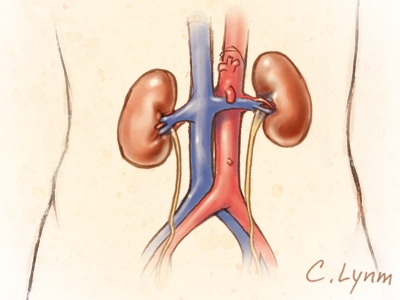 Impaired kidney function often accompanies heart failure (HF) and is associated with a worse prognosis. A post hoc analysis of the Treating to New Targets (TNT) trial examined whether the observed decrease in HF hospitalizations with high- compared to low-dose atorvastatin could be related to improvements in kidney function. Impaired kidney function often accompanies heart failure (HF) and is associated with a worse prognosis. A post hoc analysis of the Treating to New Targets (TNT) trial examined whether the observed decrease in HF hospitalizations with high- compared to low-dose atorvastatin could be related to improvements in kidney function.
 Of 10,001 TNT participants, 9,376 had estimated glomerular filtration rate (eGFR) measurements at baseline and 1 year and were included in this analysis. The association of change in year-1 eGFR and subsequent HF hospitalization was examined. In total 218 participants developed subsequent HF hospitalization. Little change in eGFR occurred over 1 year in the atorvastatin 10-mg group, whereas eGFR improved in the 80-mg group by 1.48 ml/min/1.73 m(2). Subsequent HF was preceded by a decrease in eGFR over 1 year compared to modest improvement in those without subsequent HF. After adjusting for baseline eGFR, each 5-ml/min/1.73 m(2) increase in eGFR at 1 year was associated with a lower risk of subsequent HF hospitalization. Of 10,001 TNT participants, 9,376 had estimated glomerular filtration rate (eGFR) measurements at baseline and 1 year and were included in this analysis. The association of change in year-1 eGFR and subsequent HF hospitalization was examined. In total 218 participants developed subsequent HF hospitalization. Little change in eGFR occurred over 1 year in the atorvastatin 10-mg group, whereas eGFR improved in the 80-mg group by 1.48 ml/min/1.73 m(2). Subsequent HF was preceded by a decrease in eGFR over 1 year compared to modest improvement in those without subsequent HF. After adjusting for baseline eGFR, each 5-ml/min/1.73 m(2) increase in eGFR at 1 year was associated with a lower risk of subsequent HF hospitalization.
 This relation was independent of treatment effect or change in low-density lipoprotein cholesterol level at 1 year. In conclusion, treatment with high- compared to low-dose atorvastatin was associated with improvement in eGFR at 1 year, which was related to a decrease in subsequent HF hospitalization. This suggests that improvement in kidney function may be related to the beneficial effect of high-dose atorvastatin on HF hospitalization. This relation was independent of treatment effect or change in low-density lipoprotein cholesterol level at 1 year. In conclusion, treatment with high- compared to low-dose atorvastatin was associated with improvement in eGFR at 1 year, which was related to a decrease in subsequent HF hospitalization. This suggests that improvement in kidney function may be related to the beneficial effect of high-dose atorvastatin on HF hospitalization.
|

